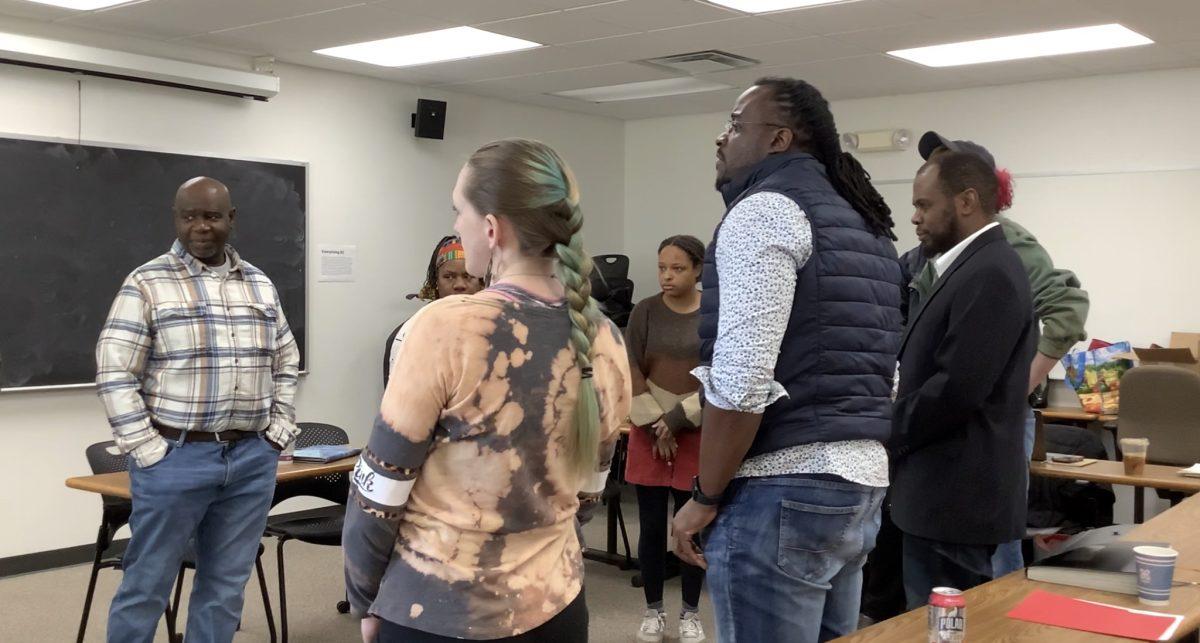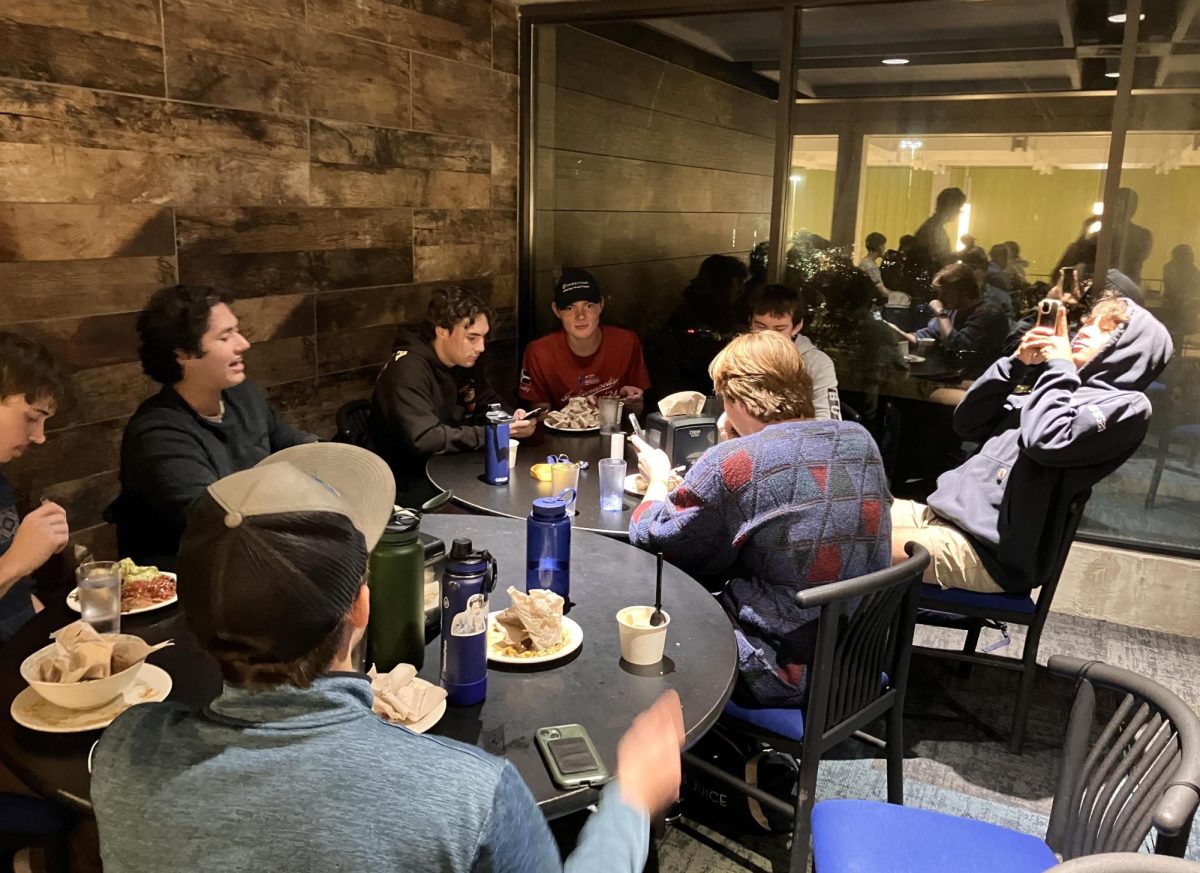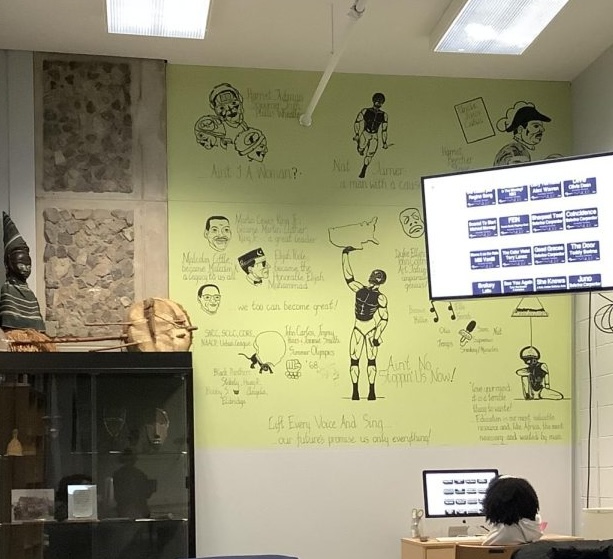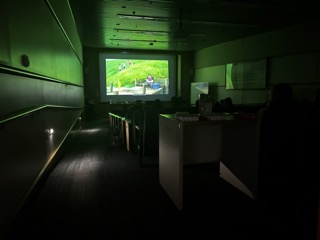
When Jahmar Ortiz speaks with their fellow actors in a scene of the play “A Day,” they can hear the responses in real time, but they cannot see the other characters. They also cannot hear or see the audience at all.
“During rehearsals and things, we were used to hearing our team giggle or chuckle or make realizations and have that sort of audience experience, but now, stone-cold silence,” Ortiz, a senior acting major at Ithaca College, said. “We’re just moving through the play with confidence, hoping that these things work and they land.”
The Cherry Artists’ Collective, a self-governing group of local theater and performance artists in Ithaca, is currently staging the English-language premiere of “A Day,” a play by Québecoise playwright Gabrielle Chapdelaine, as part of its 2020–21 season. The show opened Nov. 13 and is running through Nov. 21.
The play is being livestreamed from the State Theatre of Ithaca, where four actors are performing live on camera from separate green screen booths, their performances mixed in real time.
“Because it is such an unusual, interesting structure, it actually seemed like … it would offer itself to do a really interesting livestream production, so that’s what we’ve done,” said Samuel Buggeln, artistic director of The Cherry and director of “A Day.”
Buggeln said that he founded The Cherry Artists’ Collective approximately five years ago as an opportunity for artists in Ithaca to have more work and more input in their work. The collective focuses on international plays and plays developed in and about Ithaca, he said.
When the pandemic hit, the collective had to cancel its spring production, Buggeln said. He said he immediately began brainstorming what the group could be doing instead.
“We thought right away, we’re the experimental theater company — what can we do to respond to this crisis?” Buggeln said.
He said the collective quickly commissioned a new work, “Felt Sad, Posted A Frog,” and did a livestream production of it from May 1 to 9, with the actors Skyping in from their homes.
Buggeln said the production team used Open Broadcaster Software (OBS), a cross-platform streaming and recording program, for the livestream.
One of the main detriments of remote live theater, Buggeln said, is the audio delay.
“There’s this lag, just a tiny quarter-second lag before everybody hears what everybody else says, and … to me, that really kills the rhythm of theatrical speech,” he said.
Buggeln said that for “A Day,” he worked with video designer Noah Elman to figure out a better way to use OBS and produce livestreamed theater.
“What we thought was that if we get all of the actors in one big room, … then they could be far enough apart, they can be on green screens, so we can control their cameras, we can control the lighting, all the stuff you can’t control when people are at their houses on Zoom,” he said.

During the pandemic, there has been immense growth and experimentation in the virtual subgenre of theater. Productions have ranged from multi-camera films of existing shows to dramatized video calls and interactive Zoom plays.
Online theater has made the industry more widely accessible, both physically and financially. Buggeln said that during the opening weekend of “A Day,” viewers from all across the country tuned in.
“The necessity of doing very digital … theater because of the pandemic has actually potentially expanded our audience base,” Buggeln said.
Ortiz said they first worked in a Cherry production last year. They said that they were invited back for “A Day” and that they were happy to be participating.
“I was just excited to see what it would become,” Ortiz said. “And I was happy to have a job in this time, too.”
A study from the Brookings Institution found that in the creative economy in the U.S., the fine and performing arts industries are being hit the hardest, with estimated losses of approximately 1.4 million jobs and $42.5 billion in sales, according to the study.
Buggeln said the rehearsal process for “A Day” began over Zoom, with Wendy Dann, associate professor in the Department of Theatre Arts at Ithaca College — who was initially going to direct the show but had a conflict — working with the actors on their performances. Then, he said, he took over, and the tech process began.
“First we built one booth, and … we just worked and worked and worked on their movements relative to the two cameras that are in every booth,” Buggeln said. “For a long time, they were all rehearsing individually, and then finally we brought them all together.”
Buggeln said that directing “A Day” has been a lot of work and that he faced a steep learning curve but that he was happy to be able to continue his work.
“I think people’s need to tell stories and experience stories never goes away, and there is something about the liveness, even if it’s … mediated in some way that it still feels special,” he said.












